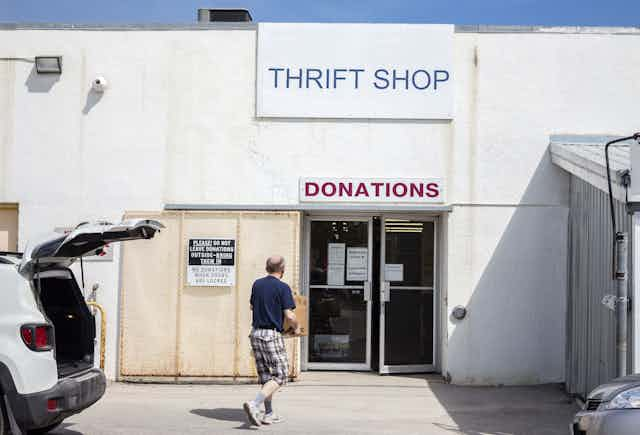The 30 percent of American taxpayers who itemize are free to deduct every dollar they donate to an IRS-approved charity from up to half of their taxable income. While neither the White House nor lawmakers are trying to scrap the charitable deduction, which is nearly as old as the income tax and marks its 100th anniversary this year, some of the changes to the tax code that Republicans in Congress and President Donald Trump are proposing could discourage charitable giving as an unintended consequence.

As a scholar of the economics of philanthropy, I recently co-led a study that modeled how donors would respond to two major tax reforms Republican lawmakers and the Trump administration support. We determined that both would reduce giving.
We also predicted the effects of another concept backed by some lawmakers and many experts: letting every American who pays income tax take advantage of the charitable deduction.
The Republican proposals
People give to charities for many reasons. Tax breaks cannot be the main one, as giving your money away can’t make you better off financially, regardless of your tax bracket. However, Americans tend to donate more when the government gives us incentives to do so. Similarly, we give less when Uncle Sam scales those advantages back.
That is why three of the changes being proposed could potentially change how much money Americans give to charities. They include:
- Cutting the top marginal tax rate for the highest-earning Americans to 35 percent from 39.6 percent.
- Roughly doubling the standard deduction from the current levels of US$6,300 for individuals and $12,600 for couples.
- Doing away with the estate tax, which is levied on the very richest Americans and applies only to the inheritance left by about one out of every 500 people who die.

Discouraging donations
To gauge the impact the first two of these three changes – as well as universal access to the charitable tax deduction – might have on giving, I co-led an Indiana University Lilly Family School of Philanthropy study. Independent Sector, which advocates on behalf of the entire nonprofit and philanthropic sector, commissioned it, but our approach to all of our research projects is designed to be completely impartial. We plan to study the effects of eliminating the estate tax on charitable giving later.
Perhaps unsurprisingly, we found that as income declined, households were more sensitive to this cost. In addition to pretax family income levels, we controlled for other variables such as age, the presence of children living at home and marital status. We partnered with the American Enterprise Institute, a conservative-leaning think tank, to simulate the impact of these hypothetical changes in tax policy on federal individual income tax revenue and total charitable giving by households.
Our results suggest that dropping the top marginal tax rate to 35 percent would reduce charitable giving by 0.8 percent, or $2.1 billion, from the estimated $282 billion American households gave to charity in 2016, according to an annual report that my colleagues research and produce together with the Giving USA Foundation.
The nonpartisan Joint Committee on Taxation, a congressional committee, has estimated that at most 5 percent of households would itemize their income tax returns following the changes the Trump administration aims to make, down from roughly 30 percent.
High-income Americans are already far more likely to itemize their taxes. For example, 92 percent of Americans earning more than $200,000 per year itemized, compared with only 6 percent of those making less than $25,000, in 2013, according to the nonpartisan Tax Foundation. That disparity would grow even larger should the White House’s tax proposal take effect.
In addition, this dramatic increase in the standard deduction, we found, would would hurt charities even more than cutting tax rates: Giving would fall by 3.9 percent, or $11 billion.
Further, we projected that both lowering tax rates and doubling the standard deduction could reduce charitable giving by households in 2016 by up to $13.1 billion – an approximately 4.6 percent decline.
We also calculated that giving to churches and other religious charities would drop slightly more than giving to secular nonprofits.
There are only slight differences between the increases now being officially proposed in the standard deduction and the increases we used in our study. However, Trump and the GOP propose eliminating personal exemptions, effectively folding them into the larger standard deduction. I believe that would reduce the value of the standard deduction.
In turn, charitable giving might decline slightly less than we originally anticipated should these changes be implemented.
A universal tax break
Our findings about how those changes would probably depress donations garnered broad media coverage. But we also considered the potential impact of a universal charitable tax deduction, which was on the books from 1982 to 1986.
We determined that giving would rise if the government were to let all taxpayers deduct their charitable gifts from their federal taxes, even if tax rates fell and the standard deduction doubled. That conclusion drew less attention. If paired with those other two changes, we estimate that charitable giving would rise by $4.8 billion, a 1.7 percent gain.
Without the changes Republicans are proposing, we estimated that making the charitable tax deduction universal alone would generate up to $12.2 billion in additional giving, a 4.3 percent gain.
Safeguarding charitable giving
During the presidential campaign, Trump proposed capping all itemized deductions, including charitable contributions, at $100,000 for individuals and $200,000 for couples. The current Republican tax proposal does not take that approach, which would discourage giving by high-income taxpayers.
Rather than limit incentives for giving to only the richest Americans, the government could instead choose to make this tax break universally available – an approach that the White House and Republican congressional leaders haven’t embraced so far.
What’s more, U.S. charities are likely to lose government funding in the near future due to the Trump administration’s proposed budget and spending priorities.
Extending the charitable deduction to all taxpayers would not shield nonprofits – including groups that do educational, cultural and environmental work and organizations that provide social services – from the fallout they anticipate following the proposed federal budget cuts and tax code overhaul.
However, creating a universal deduction would provide some relief to charities from those budget cuts, as well as the reduction in giving some of the proposed tax policy changes could bring about.
Editor’s note: This is an updated version of an article originally published on June 27, 2017.

